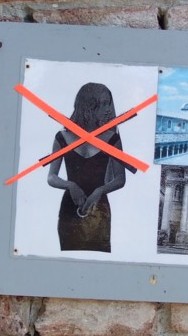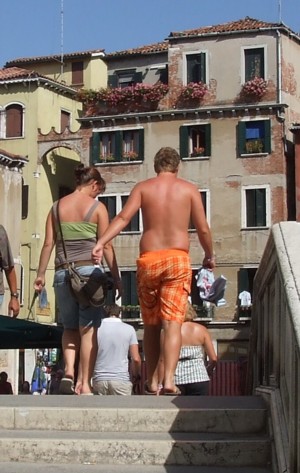Important advice for tourists
Venice is a city utterly over-run by tourists. Fair enough, money from tourism is crucial for the city. But Venice is also home to thousands of people going about their everyday business (and they’re not all dependent on tourists for their livelihoods). So visitors should bear in mind that that is what they are – visitors – and make an effort to behave appropriately.
Every year as summer approaches, plaintive pleas from the council are plastered around Venice’s tourist sights urging tourists to behave with decorum. There was even an awareness-raising ‘decorum week’ inaugurated at one point, with a parade of boats down the Grand Canal. And, like many places in Italy, Venice reminds visitors regularly of the threat of fines for picnickers and bare-chested men. I won’t advise you not to drop litter; that goes without saying and I don’t think anyone reading this page would dream of littering. But some local ‘rules’ of behaviour are less obvious so I’ve done my best to come up with some advice that will help you to give tourists a good name.

Walk on the right
This is the cultural tendency in Italy, and in several other countries too. Visitors from the UK, where we favour freestyle walking, can take a long time to tumble to this. In Venice, where the narrow lanes are thoroughfares used by all, tourists and busy locals, this is absolutely vital. You should keep to the right, always allowing room for others to pass (stick to single file when necessary). Keep to a brisk pace on busy paths. If you want to stop to look in a shop window or consult your map, pull in, removing yourself from the stream of traffic just as you would if you were driving. Spare a few moments to imagine what it must be like for those who have to take these tourist routes every day to get to their office or run urgent errands.

Don’t block bridges and don’t picnic
On a similar note, don’t obstruct bridges. If you must stop on a narrow bridge to admire the view (and in picturesque areas, it’s hard not to), keep out of the way and don’t cause a traffic jam. Do not sit on bridges to eat your lunch unless you want to infuriate hundreds of passers-by. Public picnicking, incidentally, is frowned on in general and in some areas it’s banned. From time to time the police threaten to fine people attempting to eat in public places around St. Mark’s Square; I’ve seen picnickers being moved on. Don’t sit on the floor, steps, or shop window ledges. Try to find an out-of-the-way spot where you can sit decorously on a bench.
Boat etiquette
And next, be considerate on boats. Venice’s ferries get very crowded. Boatmen will often urge passengers to move forwards (‘avanti!’) and to find space inside the boat. Tourists who hang around near the gangplanks will prevent other passengers from getting on and off, and will win themselves no friends. Don’t be too worried about getting through the crowds when you reach your stop. Once your ferry has moved off from the preceding stop, head for the exit, uttering a firm ‘permesso’ when you need to pass someone. Take off your rucksack when you’re on a boat.
Dress decently
This is necessary if you want to enter churches or monuments. Women and men should basically be covered from the collar-bone to the knee, or as near as possible. Shorts and bare shoulders will give offence in these religious or sacred sites, and may result in you being barred from entrance, though a scarf or sarong can save the day. I’ve seen tourists with sleeveless tops turned away after queuing at St. Mark’s.

Don’t dress for the seaside. If you’re visiting the beaches at the Lido, by all means (un)dress appropriately when you’re on the sand. But away from the sea, Italian men do not go bare-chested, and both men and women tend to cover themselves up more than the British or Americans. (Women may dress provocatively but not in a whole-expanse-of-skin way like Anglo-Saxons). Dressing for the beach gives serious offence in towns and even more so if you attempt to board public transport or enter a restaurant. Some Italian towns are so fed up by scantily-clad tourists that they have introduced by-laws officially banning bikinis and bare chests on the streets and listing financial penalties. Venice joined them: men – if you go bare-chested you will offend other people and you could get hit by a big fine.
Be polite
As I mention elsewhere on Italy Heaven, I think it’s only good manners to learn a few phrases in Italian – at the very least, it would be good to master ‘please’, ‘thank you’ and ‘do you speak English?’. Your guidebook should give you the basics, or alternatively consult our page about the Italian language.
On this site
Useful external links